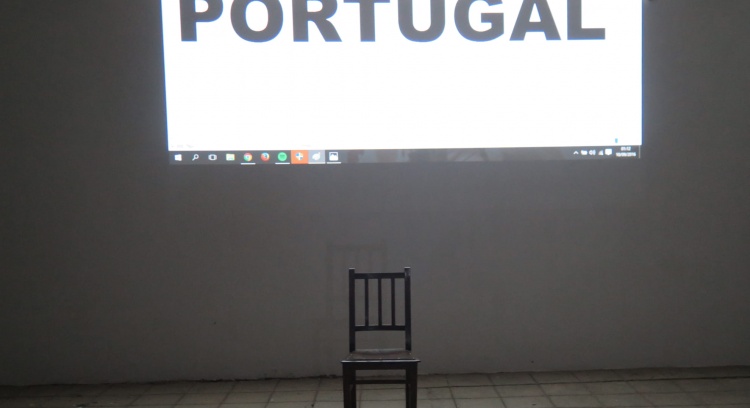Lusitania, we want to present the data of a game that we have all played since the first cry. Or that someone plays for us. Symbologies of powers, political parties, economic powers and "maternal" instincts.
The short film "Lusitânia's Lovers" is a critical reflection on the situation of Portuguese young people since the impact of the financial crisis of 2008. However, the project aims to awaken the viewer to the presence of common denominators, In relation to the relations of dependence between political and economic power, as well as the decreasing levels of participation and involvement of civil society in the reality of the country. The interest of this short film also lies in the contrast between a seemingly simple story and the complexity and density of the characters and relationships that compose it, promoting several layers of reading. Without advocating a Manichean interpretation, it is the power of art as an instrument of alienation, of active citizenship, of critical thinking defended here. The narrative takes on the guise of a loving relationship because it is with strong emotions, a mixture of positive and negative feelings, that the generation here portrayed narrates its Lusitania. A relationship in crisis that awaits salvation, the end or the deadly indifference of daily disinterest. The short film "The Lovers of Lusitania" aims to reflect critically on the impact of the 2008 crisis on young Portuguese, boosting parallels with other European realities. It thus characterizes the complex relationship of love and unloving that this generation develops in relation to its homeland. It seeks, further, to question Portugal, in the transversality of historical times and political regimes, investigating how the alliance between the political and economic powers conditioned the relationship of the country with its citizens. Discarding the linearity of the narrative of the culpability of others, an exercise of self-analysis of Portuguese citizenship is promoted, not necessarily seeking answers or definitive solutions, but questioning the consequences of attitudes of estrangement, hopelessness and conformism.
About the author
Emanuel Rodrigues, Arganil (1986) In his path through the theater, he went to Coimbra, where he graduated in Theater and Education from the Polytechnic Institute of Coimbra, with professors António Fonseca, António Mercado, Manuel Guerra, among others. It was in the context of education that he went to the Czech Republic where he was professor of dramatic expression at the British and International School of Prague and Stanislavsky's technical professor at the College of Prague. He collaborated with the Camões Institute in Prague as a theater professor and, mainly, in projects to promote the Portuguese language and Portuguese authors in Czech like Gil Vicente and Fernando Pessoa. Already as an actor, and beginning his career, he collaborated and developed children's and youth theater shows in various parts of Lisbon, traveling, through the same works, various parts of the country. He was an actor in "The Bear Educational Theater" (Educational Mark of the European Union 2004), with which he participated in several tours through central Europe. He participated in TV series like "Borgia" and "Crossing Lines" of the channel AXN, with which he collaborated, regularly, doing folds in English language. With his fascination for all the domains of the theater, he developed as a director starting with texts by Schnitzler, Max Aub and Gil Vicente. Translated into English and created, in partnership with the author Lívia Jappe, the show "Ruptura" from the book "Fission" of the same author (the finalist work of the São Paulo Prize for Literature 2010) which premiered in Prague and was also taken To the scene in Lisbon. He created the show "Hra o Pekelne Lodi" from Gil Vicente and had Portuguese speakers at Dom Carlos University in Prague. He staged "The One Who Says Yes / No One" by Bertolt Brecht, "Cultural Act" by Ignacio Cabrujas, among others. He created the "Círculo de Giz" platform, which he directs today, which is based on community theater and educational projects. He premiered as assistant director and stage director at the Teatro Aberto already this year in the show "Live and live" by Raúl Malaquias Marques and with staging by Fernando Heitor. Team: Luís Ferreira: Cinema Margarida Dias: Theater and Education André Cruz: Theater and Production
Budget and due dates
Travel Expenses: € 150 Food (2 days running): 100 € Costumes and Props: 50 € Disclosure Material: € 100 Extras: € 100 Deadline: 30 June
Images
Documents
